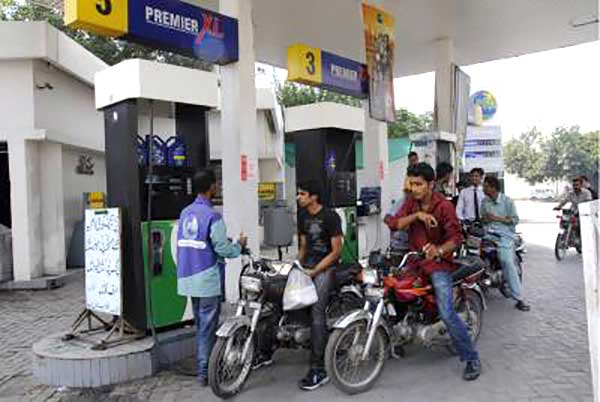The Pakistan government under Prime Minister Shehbaz Sharif dropped another bomb of inflation on the masses on Thursday as it jacked up petrol price by Rs 22.20 per litre and increasing gas price by at least 124 per cent, plunging the already inflation-hit people into further stress and struggle.
As per the latest notification issued by the government effective from Thursday, the prices of petroleum products were revised as follows:
MS (petrol) revised to Rs 272.00 a litre, high-speed Diesel (HSD) price revised to 280.00 litre, kerosene oil (SKO) price revised from Rs 189.93 to Rs 202.73 and light diesel oil revised from Rs 187.00 to Rs 196.68, all effective from Thursday.
The decision came weeks after the government increased prices of petroleum products by Rs 35, a decision undertaken two days before the scheduled revision of prices.
Sources in the Finance Ministry said that the decision has been taken to manage the depreciation of Pakistani rupee against the US dollar, since an artificial cap on the local currency was removed and the rupee value was allowed to decide its value as per the market-based currency exchange rate.
Moreover, the government has also jacked up sale prices of gas on the advice of the Oil and Gas Regulatory Authority (OGRA), increasing the gas sale price from 16.6 per cent to at least 124 per cent for categories of consumers of the Sui Northern Gas Pipelines Limited (SNGPL) and the Sui Southern Gas Company (SSGC).
To add more to the misery of the locals, the revised prices of gas have been put to effect from January 1, 2023, leaving the masses shell-shocked and clueless as to how the latest inflation bomb will further damage their lives.
The Pakistan government is forced to take these decisions as it continues to engage with the International Monetary Fund (IMF) in a desperate effort to get its ninth review of the IMF EFF (Extended Funding Facility) approved and release of $1.1 billion, for which IMF has demanded implementation of tough pre-conditions if Islamabad wants to revive the IMF programme.
Pakistan is currently at the lowest level in terms of its foreign exchange reserves, which stand at just over $2 billion, enough to meet only three weeks of imports.
Finance Minister Ishaq Dar had earlier expressed his anger at the IMF for not approving Pakistan's ninth review and had stated that if the IMF team does not visit Pakistan, he doesn't not care, adding that Pakistan would handle the situation from elsewhere.
However, with all other countries, including China, linking their financial support to Pakistan with the revival of the IMF programme, Pakistan is left with no other option but to nod to all the tough demands of the IMF, which include multi-decade high inflation of at least 27 per cent and rising.
As virtual talks with the IMF team continue, Pakistan government has also laid a supplementary finance bill aka 'mini-budget' before the Parliament for debate and approval, proposing to raise the goods and services taxes (GST) from 17 per cent to 18 per cent, which Dar said would help raise at least Rs 170 billion in extra revenues during the current fiscal year ending July.
The finance bill also proposes increase in taxes on luxury items to at least 25 per cent. Moreover, it also proposes price hike for air travel, cigarettes and sugary drinks etc., which has been widely questioned and criticised by the coalition partners of the government and the opposition benches.
But analysts say that Pakistan has no other option but to accept all the demands of the IMF and revive the funding programme to save the country from bankruptcy, which under the current situation seems eminent.


PM Modi gives booster shot to Sri Lanka’s clean energy drive
Prime Minister Narendra Modi and Sri Lankan President Anura Kumara Dissanayake on Saturday participated in the groundbreaking ceremony of the 120 MW Sampur Solar power project, being developed as a joint venture between the two nations.
Ayodhya dons divine decor ahead of Ram Navami, extensive security grid in place
With just a day to go for Ram Navami, Ayodhya is witnessing extensive preparations for Shri Ram Janmotsav, with lakhs of devotees from across India and abroad expected to arrive in the holy city on Sunday.
India steps up vigil against cheap Chinese imports amid US tariff hike
India has stepped up vigil to prevent the dumping of cheap Chinese imports in the country after the steep US tariff hike on the goods exported by the Communist country.
Unbreakable bond exists between our nations, says PM Modi after holding 'productive talks' with Lankan President in Colombo
Praising Sri Lankan President Anura Kumara Dissanayake for his "personal commitment to India-Sri Lanka ties", Prime Minister Narendra Modi said that the two countries have added more momentum to linkages in security, trade, agriculture, housing, culture and other sectors during the bilateral discussions held at the Presidential Secretariat in Colombo, on Saturday.
India and Sri Lanka sign updated agreement on defence cooperation during PM Modi's visit
Several key agreements, including on defence cooperation and development of Trincomalee as an energy hub, were signed following the bilateral discussions held between Prime Minister Narendra Modi and Sri Lankan President Anura Kumara Dissanayake at the Presidential Secretariat in Colombo, on Saturday.
PM Modi to inaugurate Pamban Bridge in Rameswaram tomorrow
Prime Minister Narendra Modi will inaugurate the newly-constructed Pamban railway bridge in Rameswaram, Tamil Nadu on Sunday.
Sri Lanka confers its highest honour for global leaders on PM Modi
In a grand recognition of his efforts to strengthen India-Sri Lanka ties, Prime Minister Narendra Modi was on Saturday conferred with the Sri Lanka Mitra Vibhushana, the island nation's highest civilian honour for Heads of State and Government.
PM Modi accorded ceremonial welcome in Sri Lanka
Prime Minister Narendra Modi received a grand ceremonial welcome at the Independence Square in Colombo on Saturday, as Sri Lankan President Anura Kumara Dissanayake hosted him during his State Visit to the island nation.